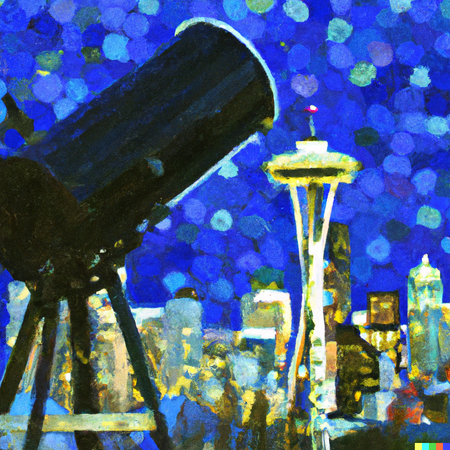Urban Astronomy
Urban Astronomy poses many challenges. Our skies are all but completely washed out by city lights that escape their intended targets or reflect off surfaces up into the atmosphere. There are numerous arguments for cities to adopt better policies for minimizing light pollution: concerns regarding wildlife health and migration, interference with human sleep cycles, creating better safety and security, energy conservation, and preserving the beautiful night sky. But it remains a struggle to convince developers, voters, and politicians that we need less light and not more. As an urban astronomer, you will become aware of the unfortunate ways lighting is applied in cities and we hope that you will become a friend and advocate of a dark night sky.
One of the best ways to help raise public awareness is to offer views through your telescope with friends and neighbors. Sharing the night sky with someone will often get them thinking about what steps can be taken to improve the view. We’ve had people offer to turn off or shield their porch lights once they’ve seen for themselves that their light source makes it difficult to look through telescopes in an urban setting. This can open the door to a discussion about good lighting practices such as shielding fixtures so that they only cast light down towards the intended target, rather than sending glare in every direction. After all, when you install a porch light are you really trying to illuminate your neighbor’s backyard and send light straight up into the night sky as well? Our advice is to keep things friendly. Ask nicely when it comes to lighting, respect the response, and offer opportunities for your neighbors to see the sky with their own eyes.
Ok, so the night sky isn’t optimal for viewing in your backyard. What types of telescopes will work best for stargazing in light polluted skies?
Solar Scopes
There are special scopes that permit you to safely view and photograph the sun. Not only is sun watching completely impervious to light pollution, but you don’t have to stay up late to do it! Plus the sun’s storms and spots change day-by-day and year-by-year, so there is always something new to look at. It’s also possible to buy a front cover for your telescope that will allow you to convert a standard telescope into one that can view the sun safely. The white light front aperture filters or the Herschel wedges allow you to see sunspot detail with excellent contrast. There are also dedicated hydrogen alpha telescopes and the Quark, which only allow through a very narrow range of light from the sun, allowing you to see surface granularity, solar flares, and prominences!
Baader ASTF/ASSF series filters (Front aperture, white light filter, sized or loose sheet)
Thousand Oaks 2+ series (Front aperture, white light filter, sized)
White Light Herschel Wedges (Refractors only, white light)
Daystar Quark (SCTs or Refractors, Hydrogen Alpha and other specialty bandpasses)
Lunt and Coronado Solar Telescopes (Dedicated Hydrogen Alpha scope, can add double stack)
Planets
Planets are easily observed with urban telescopes. If you’ve ever seen them in the night sky, you probably noticed that Venus, Mars, Jupiter, and Saturn are all quite bright. We love the simplicity of an alt-azimuth refractor or Maksutov scope for planetary tasks. These scopes are about as hassle-free as a telescope can be and they look really attractive, so you might even find yourself leaving it set up all of the time (which is awesome because you don’t have to dig it out of a closet every time you want to take a quick look). Planetary viewing also benefits from telescopes that can support a high magnification, and that have long native focal length.
Our favorites for planet-centric viewing:
StarSense Explorer DX 102AZ (easy to learn and functional showpiece)
Televue TV 85 (gorgeous and portable scope with excellent optics)
Explore Scientific 102mm AZ (hassle-free alt-azimuth mount)
Sky-Watcher Virtuoso 90mm Maksutov (ultra portable and affordable)
Sky-Watcher SkyMax 127 AZ-GTI (motorized mount, high power, still compact)
Deep-Sky Objects
Objects in deep space will be a bit more challenging since the sky is lit up to the point where it is as bright, or brighter, than the objects you are trying to view. And while you will certainly get a better view if you can get out of town, that has never stopped us from trying to bag some nebulae and galaxies in our backyards. Here are some features and gear we’ve discovered that will help make the most of your light-polluted sky.
Computerized
A “Go-to” telescope helps greatly with object identification. Star hopping is difficult when fewer stars are visible to be used as way-markers. With a computer-aided telescope, you can align on the bright stars that are visible and then the computer takes over from there. “Go-to” means that the scope can move itself to targets. After you align the telescope on a few bright stars, it does all of the work of finding objects for you. Many “Go-to’s” interface with a tablet- or smartphone-based star chart as well, allowing you to point the scope from your screen and interact with information about your targets.
Portability
One of the great things about urban astronomy is that you can quickly view an eclipse or conjunction from your own balcony or yard. To really get the most out of this convenience, make sure that your telescope is easy to grab and set up. If you have to spend more than a few minutes setting up your gear, or if you have to make multiple trips in and out of the house, you probably won’t use your scope as frequently! Also, you will inevitably want to get out of town with your telescope so you can see deeper under dark skies, so be sure to buy a scope that fits in your car and leaves room for your camping gear and astronomy companions.
Narrowband Filters
Yes! There really is such a thing as a light pollution filter. It doesn’t remove all city light, but it can greatly enhance the appearance of nebulae by filtering out the light produced by sodium vapor lights. The effect is dramatic, making this a must-have accessory for urban observers.
Our favorites for deep-sky-centric viewing:
Sky-Watcher Dobsonians (Most light-gathering bang for your buck)
Celestron Omni 150mm EQ (Attractive and nice wide field for deep-sky object hunting)
Celestron Evolution 6" SCT (Slick computerized scope you can drive with your smart phone, tablet, etc., AND it's really portable)
Celestron CPC 9.25" SCT (Computerized and lots of aperture)
Light Pollution Filters (Fits standard eyepieces, helps mitigate light pollution, specific narrowband filters for even more contrast on specific targets)
The scopes and accessories featured on this page are our best performing and most popular for urban viewing. If you would like some help selecting the perfect setup for your backyard, give us a call! We can answer all of your questions and help you get started.
OUR RECOMMENDATIONS FOR Urban Astronomy
-
1.25" Ultra-high Contrast/Light Pollution Reduction Filter (94123)
Celestron
- Regular price
- $94.95
- Sale price
- save $-94.95
- Unit price
- per
-
10" Flextube 250P SynScan GoTo Collapsible Dobsonian
Sky-Watcher USA
- Regular price
- $1,560
- Sale price
- save $-1,560
- Unit price
- per
-
12" Flextube 300P SynScan GoTo Collapsible Dobsonian
Sky-Watcher USA
- Regular price
- $2,405
- Sale price
- save $-2,405
- Unit price
- per
-
14" Flextube 350P SynScan GoTo Collapsible Dobsonian
Sky-Watcher USA
- Regular price
- $3,460
- Sale price
- save $-3,460
- Unit price
- per
-
16" Flextube 400P SynScan GoTo Collapsible Dobsonian
Sky-Watcher USA
- Regular price
- $4,525
- Sale price
- save $-4,525
- Unit price
- per
-
8" Flextube 200P SynScan GoTo Collapsible Dobsonian
Sky-Watcher USA
- Regular price
- $1,295
- Sale price
- save $-1,295
- Unit price
- per
-
Advanced VX 6 Schmidt-Cassegrain Telescope (12079)
Celestron
- Regular price
- $1,929
- Sale price
- save $-1,929
- Unit price
- per
-
CPC 925 GPS Computerized Telescope (11074-XLT)
Celestron
- Regular price
- $3,499
- Sale price
- save $-3,499
- Unit price
- per
-
NexStar 6SE Computerized Telescope (11068)
Celestron
- Regular price
- $1,199
- Sale price
- save $-1,199
- Unit price
- per
-
NexStar Evolution 8" EdgeHD with StarSense AutoAlign (12096)
Celestron
- Regular price
- $3,199
- Sale price
- save $-3,199
- Unit price
- per
-
Omni XLT 150 Newtonian Telescope (31057)
Celestron
- Regular price
- $739.95
- Sale price
- save $-739.95
- Unit price
- per
-
Urban Astronomy: Stargazing from Towns & Suburbs
Firefly Books
- Regular price
- $19.95
- Sale price
- save $-19.95
- Unit price
- per
-
USED - NexStar 6SE Computerized Telescope (11068) w/ eyepiece kit, padded carrying case, etc.
Celestron
- Regular price
- $1,570
- Sale price
- save $536
- Unit price
- per

